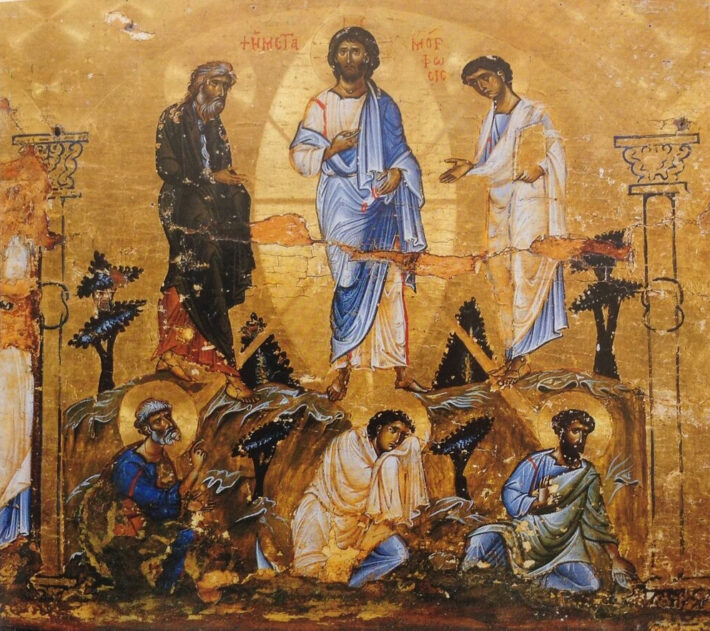Christian Art | Easter To Pentecost
John 16: 23-28 | King James Audio Bible | Daily Bible Verses Easter To Pentecost
23 And in that day ye shall ask me nothing. Verily, verily, I say unto you, Whatsoever ye shall ask the Father in my name, he will give it you.
24 Hitherto have ye asked nothing in my name: ask, and ye shall receive, that your joy may be full.
25 These things have I spoken unto you in proverbs: but the time cometh, when I shall no more speak unto you in proverbs, but I shall shew you plainly of the Father.
26 At that day ye shall ask in my name: and I say not unto you, that I will pray the Father for you:
27 For the Father himself loveth you, because ye have loved me, and have believed that I came out from God.
28 I came forth from the Father, and am come into the world: again, I leave the world, and go to the Father.
Jesus continues to prepare his disciples for the joy of his Resurrection and for the mission of the disciples, to evangelize, bringing to people all over the world the good news of Jesus Christ, of our salvation.
Because they have believed in Jesus, they may ask what they wish of the Father in the Son’s name. In the Acts of the Apostles, we hear of the miracles worked by the disciples, these the signs and wonders which they are empowered to perform in order to help people to believe. The joy the disciples will then experience is the joy of salvation, which will continue to shine even in times of greatest difficulty and hardship. Such is the joy that is with us to the present day, as we pray to the Father in the name of the Son, as Christ’s gift of himself intercedes for us, and as we seek to do good works for others, as we witness Christ.
Jesus has taught his disciples in greater detail than he has the crowds. He has, though, also used metaphors and parables when instructing the disciples, stimulating their curiosity and encouraging them to ask Jesus questions. Jesus now tells his disciples that, very soon, he will speak to them clearly and plainly, so that they may have an exact understanding of the truth they are to preach to the world. This will be after the Resurrection, when they will know that Christ has indeed conquered death, witnessing the glorified Christ at first hand.
‘Perfect patience is to follow Christ faithfully, even to death, but for perfect knowledge we must await his coming. Here, in the land of the dying, the sufferings of the world must be endured; there, in the land of the living, shall be seen the good things of the Lord.’ St Augustine
King James Audio Bible | Endnotes
Ask And Ye Shall Receive | Trust And Brotherhood In Jesus
The phrase ‘Ask, and ye shall receive’ is a source of inspiration and hope for Christians. It is a reminder that we can approach God with confidence and that He is willing to hear our prayers and answer them according to His will.
In his commentary on John 16:23, Augustine of Hippo writes, ‘Let us then ask in the name of Christ, not the things that we would like, but the things that are expedient for us; and let us be assured that whatever we ask in his name, according to his will, we shall receive.’
Martin Luther, in his commentary on the Gospel of John, emphasizes the importance of asking in Jesus’ name, saying, ‘For we must not only pray, but we must pray in the name of Christ, that is, with the confidence that our prayer is pleasing to God because it is offered in the name of his beloved Son.’
John Calvin, in his commentary on John 16:23, says, ‘We are commanded to ask, that our faith may be exercised; and we are promised that we shall receive, that our faith may be confirmed.’
In modern times, in his book Prayer: Does It Make Any Difference?, Philip Yancey writes, ‘Jesus promised that prayer would work, but he did not specify how, when, or why. He simply told us to do it, to pray boldly and often, to trust that God hears us.’
Tim Keller, in his book Prayer: Experiencing Awe and Intimacy with God, writes, ‘Prayer is our primary way of participating in God’s work. God has ordained that he will do certain things in the world in response to prayer that he will not do otherwise.’
Asking in Jesus’ name is tied implicitly to Jesus’ oneness with God the Father. In his commentary on John 16:23, John MacArthur writes, ‘The disciples’ prayers would be heard by the Father as though they were Jesus’ own prayers, because they were praying in his name, which means with his authority and according to his will.’
Prayer With Jesus | Ask And Ye Shall Receive
Prayer in Jesus’ name is closely related to Jesus’ teachings on the unity of believers with Jesus and with each other. Richard Foster writes, ‘To pray in Jesus’ name is to pray with his authority, to pray with his purpose, to pray with his character, to pray with his values. It is to pray as though Jesus himself were making the request.’
C.S. Lewis writes, ‘The Christian is called not to individualism but to membership in the mystical body…For the body itself is one, and has one heart.’
Pope Benedict XVI and Pope Francis have both emphasized the importance of prayer as a means of drawing closer to Christ and growing in our relationship with Him. In his encyclical Deus Caritas Est, Pope Benedict XVI writes that prayer is ‘the first and indispensable source of the Church’s life’. He explains that prayer enables us to open ourselves to God’s love and to be transformed by that love, which then empowers us to bear witness to Christ and His message of love and salvation.
Pope Benedict XVI also emphasizes the importance of praying in Jesus’ name. In his book Jesus of Nazareth: Holy Week, he writes that praying in Jesus’ name ‘is the expression of the believer’s new relationship with God, which has been made possible through Christ’. By praying in Jesus’ name, we are acknowledging our dependence on Christ as our mediator and savior, and we are affirming our faith in his saving power.
Pope Francis similarly emphasizes the importance of prayer as a means of deepening our relationship with Christ. In his encyclical The Joy of the Gospel, he writes that prayer is ‘a constant interplay between God and man’ and that it enables us to experience the joy and peace that come from being in communion with Christ. Pope Francis encourages believers to make prayer a daily habit and to approach it with humility and trust.
Both Popes Benedict XVI and Francis also highlight the importance of living in unity and fellowship with one another. In his encyclical Fratelli Tutti, Pope Francis writes that ‘we are all brothers and sisters’ and that we are called to love one another and to work together for the common good. He emphasizes the importance of building relationships based on mutual respect and trust, and he encourages believers to reach out to those who are marginalized and in need.
Pope Benedict XVI similarly emphasizes the importance of living in community and fellowship with one another. In his book Introduction to Christianity, he writes that ‘the Church is the community of those who have been called and who believe in Christ’ and that believers are called to live in unity and harmony with one another. He encourages believers to put aside their differences and to work together to build up the Church and to bear witness to Christ’s love and saving power.
Jesus Of Nazareth: Holy Week
In Jesus of Nazareth: Holy Week, Pope Benedict XVI discusses John 16:23-28 in the context of Jesus’ farewell discourse, where Jesus is preparing his disciples for his imminent departure. He explains that Jesus is telling his disciples that they will soon experience a time of separation from him, but that they should not be afraid because they will continue to have access to him through prayer.
Pope Benedict XVI highlights the importance of Jesus’ promise that ‘whatsoever ye shall ask the Father in my name, he will give it you’ (John 16:23, KJV). He explains that this promise is based on the relationship of love between the Father, the Son, and the disciples. When the disciples ask the Father for something in Jesus’ name, they are participating in Jesus’ relationship of love with the Father, and so their prayer is answered.
Pope Benedict XVI also emphasizes that Jesus’ promise is not a magic formula for getting whatever we want, but rather a call to deeper faith and trust in God. He writes that the promise is based on the disciples’ trust in Jesus and their willingness to align their will with God’s will. He explains that ‘prayer in Jesus’ name’ means praying with Jesus’ heart and will, and that it involves entrusting our lives and our needs to God’s loving care.
In addition, Pope Benedict XVI discusses how this passage relates to Jesus’ oneness with God the Father. He explains that Jesus’ prayer in John 17, known as the ‘Priestly Prayer’, expresses his deep intimacy with the Father and his desire for his disciples to share in that intimacy. He writes that ‘Jesus’ prayer is the way in which he leads us into his own communion with the Father.’








